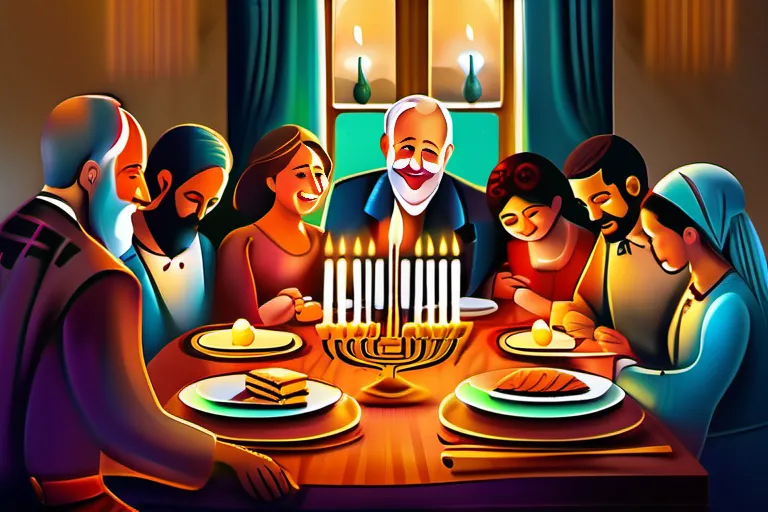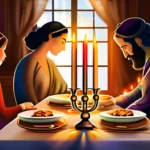Explore the central role of family in Jewish beliefs, traditions, and daily life.
Family is a cornerstone of Jewish society, shaping religious practices, cultural identity, and community bonds. In this article, we delve into the profound importance of family in Judaism, exploring its role in various aspects of Jewish life.
The Role of Family in Jewish Beliefs
Why does Judaism place such a strong emphasis on family? Is it just about blood ties and lineage, or do families in Judaism carry a deeper, more profound significance? Is the family unit the cornerstone upon which Jewish tradition and faith are built?
In Judaism, the family is not merely a social construct but a sacred institution. The concept of ‘Kiddush Hashem,’ sanctifying God’s name through one’s actions, extends to how we conduct ourselves within our families. Every interaction, every commandment fulfilled, and even every challenge overcome can be seen as an opportunity to glorify God, much like a family member helping another in need or teaching the young ones about their heritage.
Consider the mitzvot (commandments) that bind generations together. The commandment of honoring one’s parents (Kibbud Av V’Em) is not just a personal duty but an essential part of creating a harmonious and spiritually fulfilling home. This mitzvah serves as a microcosm for all other commandments, reminding us to respect authority and cherish relationships. Is it any wonder that Judaism teaches us that the essence of our faith often begins within the walls of our homes?
The family is also the primary vehicle through which Jewish culture and traditions are passed down from one generation to another. The stories, customs, and rituals shared at home create a bond that transcends time. Each holiday, each prayer, and every life cycle event is an opportunity for families to come together and reaffirm their commitment not only to God but also to each other.
Moreover, the family in Judaism serves as a support system, a refuge where individuals can find comfort, guidance, and encouragement. In times of joy or sorrow, the family’s presence is invaluable. The Talmud teaches that no one should be alone on the day they die; this underscores the importance of familial bonds.
Is it any surprise then, that Judaism emphasizes the role of family in fulfilling God’s commandments? When we care for our families and support their spiritual growth, we are, in essence, contributing to a greater cause. The Jewish family is like a tree, with each branch representing a member who contributes to its strength and resilience.
The significance of family in Judaism goes beyond mere survival; it is about building a legacy that honors the past while shaping a better future. As we strive to fulfill our roles within the family, we are, in turn, fulfilling a crucial part of our spiritual journey. Is it not true that the strength and faith of a community are deeply rooted in its families?
The role of family in Jewish beliefs is not just about obedience or tradition; it’s about nurturing a bond that endures through generations, a bond that sustains both individual souls and the collective spirit of the Jewish people.
The Jewish Family Unit: Extended and Nuclear
Imagine a tapestry, richly woven with threads of love, tradition, and support. In Jewish culture, this tapestry is the jewish family unit, both extended and nuclear, forming a vibrant network that binds generations together.
The extended family (kehillah) serves as a vast support system, much like the branches of a mighty tree spreading wide to provide shade and shelter. Cousins, aunts, uncles, grandparents – all are interconnected, forming a web of relationships where each member plays a crucial role. This network is not just about blood ties but also about shared values and communal responsibilities.
However, it’s the nuclear family (bayit) that often takes center stage in daily life. The home, or bayit, becomes the heart of Jewish living, where traditions are passed down and new memories are created. Think of the seder table during Passover, a gathering not just for the immediate family but often including extended relatives as well. This ritual reinforces the idea that while individual families may be the core units, the community is the larger, unbreakable bond.
The Jewish family unit, whether large or small, serves multiple purposes. It is both a sanctuary and a battlefield, where personal growth meets communal obligations. Children learn about their heritage not just from books but through the actions of those around them – the daily rituals, the traditions, and the unwritten rules that make up the fabric of their identity.
From the moment a child is born until they marry or have children themselves, family plays an indelible role. It’s a cycle that perpetuates itself, ensuring that the teachings and traditions endure through generations. In many ways, the Jewish family unit is like a nurturing garden, where every member has their place, contributing to the overall beauty of the community.
Family in Jewish Daily Life
The role of family in Jewish daily life is as intricate and essential as the threads that weave together the fabric of a tapestry. Just like the threads, each member of the family holds a unique position, contributing to the richness and complexity of the whole. How does one even begin to understand the significance of family in Judaism without delving into the heart of daily rituals and lifecycle events?
Consider the Shabbat table as a metaphor for this intricate relationship. It’s not just about lighting candles or reciting blessings; it’s an opportunity for the entire household to come together, share stories, and strengthen bonds. This weekly gathering is more than just a meal—it’s a moment where every family member, no matter how young or old, has a role to play.
Then there are lifecycle events like weddings and funerals, which serve as monumental milestones in the Jewish calendar. Weddings, with their vibrant traditions and solemn ceremonies, symbolize the union of two families, creating new threads that connect generations. Conversely, funerals offer a space for mourning and remembrance, bringing family members together to honor those who have passed on.
But what about the everyday moments? How do these rituals weave into the fabric of daily life? From the blessing over bread at every meal to the bedtime stories passed down from parent to child, each act is a thread that binds the family unit. These practices are not just cultural norms but deeply rooted in spiritual and emotional significance.
Family in Judaism is like a tree with deep roots; it provides shelter, support, and sustenance. It’s the foundation upon which Jewish identity and tradition are built. So, as we explore the significance of family in daily life, let us remember that every moment spent together, whether celebrating or mourning, strengthens this bond and ensures that the traditions continue to thrive.
The Importance of Family in Jewish Education
The Importance of Family in Jewish Education
Imagine a treehouse, where the trunk represents tradition and the branches are the children’s lives. Each branch twists and turns, yet they all stem from that strong core—just as each child in a Jewish family has their unique path but is deeply rooted in their heritage.
In Judaism, education begins at home, with parents being the first teachers. This isn’t just about learning Hebrew or understanding complex religious texts; it’s about instilling values and traditions that shape a child’s identity. How many times have you heard the phrase ‘You are what your mother and father taught you’? For Jews, this is especially true, as family becomes the first classroom.
Family plays a crucial role in teaching children Jewish ethics, emphasizing concepts like tzedakah (charity) and chesed (kindness). Parents often use everyday moments—preparing for Shabbat, celebrating holidays—to impart these values. It’s like planting seeds that grow into a rich garden of moral understanding.
The process is not just one-way; it’s an intergenerational exchange. Grandparents share stories and wisdom, while children ask questions that challenge and expand their perspectives. This dialogue enriches both the old and the young, creating a tapestry of knowledge woven through generations.
Moreover, family education extends beyond religious teachings. It encompasses cultural practices, social norms, and personal development. Through these shared experiences, children learn to navigate the world with a unique Jewish lens, understanding their place within the broader community.
So, as we move forward, consider how your family’s traditions and values are passed down. Every conversation, every ritual, every story told around the dinner table is a building block of your child’s identity. In the grand tapestry of Jewish life, each thread counts, making the family an essential part of education that lasts a lifetime.
Family and Community in Judaism
The significance of family in Judaism extends far beyond the walls of the synagogue; it permeates every aspect of communal life, weaving through threads of charity, social justice, and mutual support. How many times have you heard the saying that ‘it takes a village to raise a child’? In Jewish tradition, this concept is elevated to the collective effort of families. Families are not just units of blood relations but pillars of the broader community.
Think about it: when you see a Jewish family volunteering at a food bank or organizing a charity drive, they’re not merely giving back; they’re embodying the teachings of their faith. These acts of kindness and compassion are more than just charitable gestures—they’re a reflection of the communal responsibility that families bear in Judaism. By supporting each other and reaching out to those in need, Jewish families play a vital role in maintaining the strength and continuity of the community.
Moreover, when we speak of social justice work, it often takes on a familiar face: the devoted parent or grandparent who is always ready to help. These individuals are not just upholding ancient traditions but actively shaping a more equitable world. Their involvement in advocacy and activism for causes like fair wages, education equality, and human rights demonstrates that family values extend beyond personal relationships into public action.
Families also provide each other with the emotional and financial support needed to navigate life’s challenges. In times of sickness or financial hardship, it is the family—often the extended network of relatives—that rallies around a loved one. This mutual support creates a robust safety net that fortifies not only the individuals involved but the entire community as well.
As we look at the broader Jewish community, these acts of kindness and solidarity form the backbone of its resilience and vitality. By engaging in charitable work, social justice initiatives, and providing communal support, families are building a stronger, more inclusive society that reflects the values of Judaism. In essence, family is not just a part of Judaism; it is the very fabric that holds this vibrant community together.
The Future of Family in Judaism
As we delve into the future of family in Judaism, let’s ponder on the challenges that modern Jewish families face. In today’s world, intermarriage and assimilation loom large, casting a shadow over traditional family structures and communal bonds. How can we ensure that these families remain rooted in their faith and traditions? One strategy is to strengthen educational programs that teach young people about the rich history and values of Judaism. By equipping them with knowledge, they are more likely to understand and appreciate their heritage.
Another approach involves creating support networks within communities. For example, chavurot, informal groups where families can gather for discussions or shared activities, can foster a sense of belonging. These gatherings offer spaces where challenges and successes can be openly discussed, helping to reinforce family ties and communal identity.
Mentorship programs are also vital. Pairing older members with younger ones can provide guidance and wisdom that is often passed down through generations. This transfer of knowledge not only strengthens families but also preserves the continuity of Jewish traditions and practices.
Moreover, technology offers new avenues for engagement. Virtual Shabbat dinners or family prayer sessions can bridge physical distances, keeping families connected despite geographical separation. These digital gatherings might seem novel, yet they hold the potential to strengthen familial bonds across generations and continents.
In essence, the future of family in Judaism hinges on our ability to adapt traditional values to contemporary contexts. By embracing these strategies, we can ensure that Jewish families continue to thrive and remain a vibrant part of the wider community. After all, it is through unity and support that we can weather the challenges of today and build a brighter tomorrow for generations to come.
Conclusion
 By understanding the centrality of family in Judaism, we gain a deeper appreciation for the richness and resilience of this ancient faith. Embracing the values of love, unity, and mutual responsibility embodied by Jewish families can enrich our own lives and strengthen our communities.
By understanding the centrality of family in Judaism, we gain a deeper appreciation for the richness and resilience of this ancient faith. Embracing the values of love, unity, and mutual responsibility embodied by Jewish families can enrich our own lives and strengthen our communities.











